Meeting of Catalan universities and refugees 2022, strengthening universities as spaces for international protection

Faced with the increasing need for international protection, representatives of university
refugee programmes met to work together on key issues in the academic hosting of refugees.
24/01/2023
Last December 15, the UAB Faculty of Communication was the venue for a workshop on “Refugee Hosting at Universities 2022”, organised by the FAS-UAB Hosting Programme. It was designed as a space for meeting and networking between programmes that work to promote the inclusion of forcibly displaced people at universities.
The event was attended by experts from the Polytechnic University of Catalonia (UPC), the Open University of Catalonia (UOC), the Catalan Association of Public Universities (ACUP), the University of Barcelona (UB) and, finally, the Universitat Autònoma de Barcelona.
In mid-2022, there were more than 103 million people in the world who had been forcibly displaced due to violent conflicts, persecution and violations of human rights (UNHCR, 2022). The escalation of old and new armed conflicts means that protection is once again a pressing issue. This was emphasised by Esther Zapater, general secretary of the UAB, and the experts from the FAS who opened the event, while also stressing the social role that universities need to serve. For example, the Asylum Seekers Reception Programme has been running for more than 6 years, and this year at the UAB, 34 refugee students from all over the world are studying for bachelor, postgraduate and doctorate degrees.
Darío Cerisole, a lawyer specialising in immigration law and international mobility, opened the day with a presentation on the latest amendments to immigration law and their impact on non-EU students, identifying windows of opportunity for the inclusion of refugee students. Agus Morales, journalist and editor of the international journalism and chronicle magazine 5W, then explored the conflicts in Afghanistan and Ukraine, focusing on the impact of these wars on the right to health and education.
An opening work session defined and prioritised strategic issues concerning refugees that need to be addressed by Catalan universities. The topics that were considered most important right now were, first, the differences between the response to the forced displacement crisis due to the war in Ukraine, and the arrival of refugees from other conflicts and, second, the priority issue of access to university for asylum-seekers, which ties in with such complex issues such as the diversity of access criteria among different universities, and red tape in the procedures for recognition of certificates and academic transactions.
Based on these two issues, some of the strengths of the refugee programmes at Catalan universities were highlighted, such as the trusting relationships and mutual knowledge of the professionals at the different universities, which enables the establishment of efficient informal work networks and the exchange of good practices.
By way of conclusion, 3 key targets were established in terms of impact and networking by Catalan universities concerning refugee issues:
- Establish instrumental networks between Catalan universities to work on the matter of university inclusion of refugees, in the style of “Staff training weeks”. As well as university refugee programmes, there is a need to include the education and training of international mobility and academic management staff at different universities.
- Guarantee that scholarships are not only established in terms of talent and excellence but also in terms of equity and access to rights to ensure that criteria of excellence are not disqualifying.
- Continue to strengthen collective networking, promoting actions to bring Catalan universities together on refugee issues in a coordinated strategy that exploits the full potential of universities as agents of change and as inclusive spaces for international protection.
The infographic with the results of the work sessions can be viewed here
The full reports can be read here